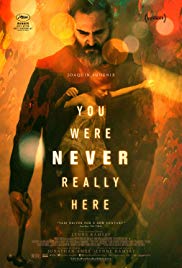
YOU WERE NEVER REALLY HERE
UK/US, 2017, 89 minutes, Colour.
Joaquin Phoenix, Judith Roberts, Ekaterina Samsonov, Alessandro Nivola.
Directed by Lynne Ramsay.
If not really here, really where?
This is quite an enigmatic title. And, enigma pervades the whole film. The central character who dominates the film is enigmatic. The situations in which he operates a certainly enigmatic. The snatches of dialogue, sometimes mumbled, sometimes indistinct voices in the background are also enigmatic.
Intriguingly, there is quite a range of popular songs, snippets of songs throughout the film ranging from The Air I Breathe, I’ve Never Been to Me and If I knew you were coming, I’d have baked a cake!
One of the consequences of all these enigmas is that the audiences could be involved out of curiosity if not emotional involvement. In fact, as we observe the mysterious, often unexplained, activities of the characters, it is as if we become detached observers. And there are enigmatic flashbacks to compound the curiosity and/or the detachment.
The visual style is also enigmatic, a blend of realism with stylised photography, darkness and light, angles, editing.
The central character is played by a rather hefty, bearded and ponytailed, middle-aged, worse-for-wear, Joaquin Phoenix. His name is Joe. We quite don’t know what is happening to him at the beginning but we just accept him, glimpses of memories, glimpses of characters, a drug deal, his having a short fuse, his returning home, some banter with his mother, especially with the musical theme of Psycho.
It emerges that he is a hitman. He also searches for young girls. But, his contacts and interviews, his targets also remain fairly enigmatic. There is a young girl, several. A political theme enters with a campaign to re-elect the governor, Joe following him in his car to his mansion, discovering a brutal massacre.
Which raises the question for the audience as to that aspect of the title: where is “here�? Is it in a story of straightforward realism? With flashbacks? Is it in the memory of Joe? Is it in his mind and imagination? Is it in his conscience? Is he going through some kind of purgative experience – with a joltingly dramatic final scene at a diner with the young girl and a moment of violence which can shock the audience, but then is reversed. And the characters are no longer to be seen, no longer “here�. And, while we saw them on the screen, where were they really?
The film was written and directed by Scottish, Lynne Ramsay, who has made some short films but in a period of more than 20 years, this is her fourth feature film (the others being rat catcher, More than Colour, We Need to Talk about Kevin). She won the award for Best Screenplay at the 2018 Cannes Film Festival. Joaquin Phoenix won Best Actor.
1. The impact? The awards, screenplay and actor at Cannes?
2. The audience observing, detached perspective, how much involvement, interest, emotions?
3. The American city, Cincinnati, the streets, apartments, the skyline, cabs? The alleys, drug dealers, the restaurants, the mansion, the diner? The film creating its own world?
4. Realism, memories, imagination?
5. The range of music, I’ve never been to me, That I Breathe, Baker Kate?
6. The enigmatic nature of the film, characters, situations, dialogue, half heard voices, flashbacks?
7. The introduction to Joe, Joaquin Phoenix and his presence, hefty, age? Scruffy, clothes, take not be shirt, wait? The memories, on the bed, the plastic, the vision of the Fort? The meaning of the flashbacks? The drug dealer, hitting him, short fuse? Going home to his mother, the Psycho theme, putting it in bed? The later sequence of her death, shot through the pillow? The young girl, families, violence? His role as hit men? Searching for the girls? The phone calls, meetings, violence and the prevalence of blood, water, putting his mother in the river, stones in his pocket, his descent into the depths, his deciding to surface again? The glass of water? Rinsing his head? The sauna? The episode with his tooth, extracting, the focus on mouth? The girl, her presence? The family, politics, the governor and re-election, Joe following him, the mansion, the massacre? Who slipped the governor’s throat? Joe, his clothes, his reaction, shutting off? With the girl, the diner, the talk, shooting himself, in his imagination, he and the girl leaving? Who was really here/on not?
8. Hits, bosses, contacts, the hammer?
9. Sexual exploitation, politics?
10. The supporting characters, his contacts, his mother, the girls, the governor, the past and its influence?
11. An impressionistic portrait?